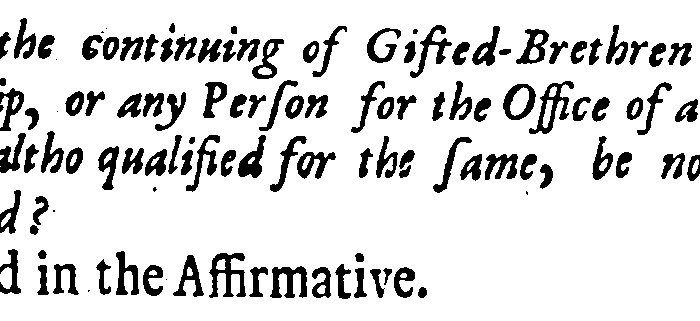In the seventeenth century, the halls of Oxford and Cambridge were closed to nonconformists. Dissenters of all kinds sought alternate methods of educating themselves through tutors, academies, Dutch universities, or church-based training.
One of the practices of the Congregationalists and the Particular Baptists was the recognition of gifted brethren in the church. These men were formally recognized as gifted to preach in the church, though not (yet) called to pastoral ministry. Candidates for ministry often came from among the gifted brethren, who were tested and trained up in their gifts. Individual churches and The Particular Baptist Fund facilitated this training through the purchase of books and other related expenses.
The church which met in Wapping, London under the pastoral care of Hercules Collins kept a book of its records, within which are two lists of books purchased for gifted brethren who were being tested or trained to serve in the church. These short lists provide a sense of what they considered essential reading for a gifted brother preparing to preach in the 1680s-1690s.
The list below is a collation of the two short lists, both of which include many of the same works, presented with modern bibliographic conventions.
Ames, William. The Marrow of Sacred Divinity. London: Edward Griffin, 1642.
Baxter, Richard. Of the Nature of Spirits; Especially Mans Soul. London: B. Simmons, 1682.
The Bible.
Bunyan, John. The Holy War, Made by Christ upon the Devil, for the Regaining of Man. London: Dorman Newman, 1684.
Charnock, Stephen. A Treatise of Divine Providence. London: Thomas Cockeril, 1680.
_____. Several Discourses upon the Existence and Attributes of God. London: D. Newman, 1682.
Coke, Zachary. The Art of Logick. London: Robert White, 1654.
A Confession of Faith Put forth by the Elders and Brethren Of many Congregations of Christians (baptized upon Profession of their Faith) in London and the Country. London: Benjamin Harris, 1677.
Cotton, Clement. A Complete Concordance to the Bible of the Last Translation. London: Thomas Downes, 1638.
Diodati, John. Pious Annotations, upon the Holy Bible. London: T.B., 1643.
An English Dictionary.
Barker, Matthew. Flores Intellectuales: Or, Select Notions, Sentences and Observations Collected out of several authors and made publick, especially for the Use of young Scholars, entring into the Ministry. London: J. Astwood, 1691.
_____. Flores Intellectuales: The Second Part Containing Three Centuries More. London: Thomas Snowden, 1692.
Haak, Theodore. trans., The Dutch Annotations Upon the Whole Bible. London: Henry Hills, 1657.
Leigh, Edward. A Systeme or Body of Divinity. London: A.M., 1662,
Newton, John. An Introduction to the Art of Logick. London: A.P., 1678.
Rowley, Alexander. The Schollers Companion, or a little Library, Containing all the interpretations of the Hebrew and Greek Bible, by all Authors. London: M. Bell, 1648.
Smith, John. The Mysterie of Rhetorique Unvail’d. London: E. Cotes, 1656.
Wilkinson, Robert. A Jewell for the Eare. London: John Stafford, 1643.

I guess I have a lot of reading to do!!!!
According to William Symington, Charnock ,could be the author you are missing: ” It is as a Writer, however, that Charnock is best known, and this, indeed, is the only character in which we can now come into contact with him. His works are extensive, but, with a single exception, posthumous. The only thing published by himself was the piece on ” The Sinfulness and Cure of Thoughts,” which appeared originally in the Supplement to the Morning Exercise at Cripplegate. Yet such was the quantity of manuscript left behind him at his death, that two large folio volumes were soon transcribed, and published by his friends, Mr. Adams and Mr. Veal, to whom he had committed his papers. The Discourse on Providence was the first published; it appeared in 1680. The Discourses on the Existence and Attributes of God came next, in 1682.”
Why don’t modern seminaries give more focus toward teaching logic classes? I think logic with a biblical foundation is woefully under appreciated. Certainly our Baptist forefathers appreciated it.